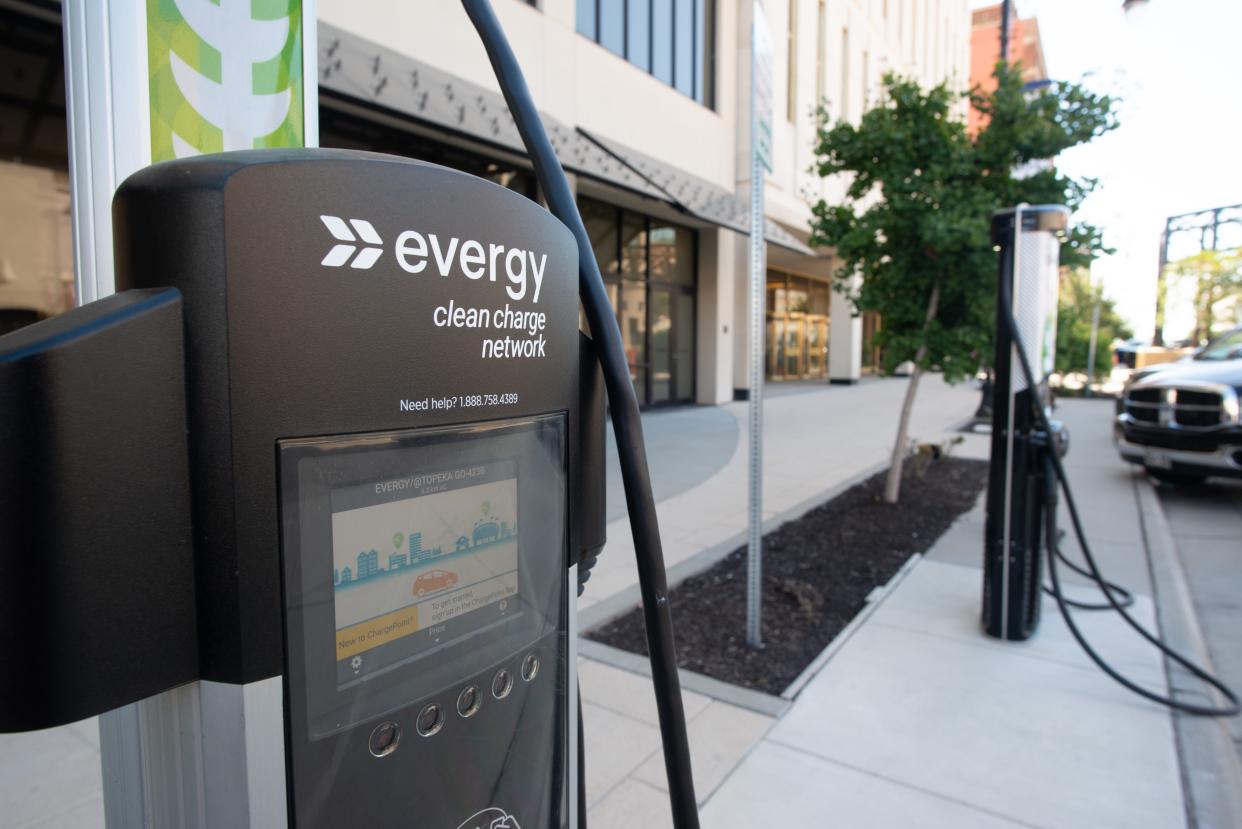Evergy electric vehicle plan approved by Kansas energy regulators, minus charging network endorsement

Government utility regulators authorized a plan to promote electric vehicles in Kansas, but did not give Evergy pre-approval for expanding its charging station network at a cost to ratepayers.
The Kansas Corporation Commission unanimously backed an order issued Monday, which came on the heels of a non-unanimous settlement agreement.
Evergy's transportation electrification portfolio is highlighted by a series of charging station rebate programs, but also includes charging service rates, consumer education, administration budgeting and tracking of program costs.
A related expansion of Evergy's Clean Charge Network was praised by regulators, but did not receive the level of commission support the company had asked for.
"Evergy’s proposal was designed to encourage investment in the infrastructure needed to support broader adoption of electric vehicles," company spokesperson Gina Penzig said in an email. "Electric transportation with rate structures that encourage off-peak charging has the potential to make the electric grid more efficient by increasing use during times of lower demand. This helps drive down costs for all customers."
The company estimates $72.3 million in customer benefits to the Kansas metro territory and $46.9 million to the central Kansas area through 2040, according to documents filed with KCC.
"Long-term, electric vehicle charging has the potential to reduce costs for all customers by spreading the utility’s fixed costs among more users," commission staff said in a news release. "Evergy will be permitted to submit the costs for rebates, customer education, and administration of the program for Commission review in its next rate case."
Rebates and charger network
The rebates include hundreds of dollars in incentives for homeowners to install Level 2 charging, which use 240-volt outlets to charge vehicles faster than traditional 120-volt outlets.
Developers would be in line for other rebates intended to get such chargers installed in newly constructed homes, while third parties could get rebates for commercial charging infrastructure. Large fleet operators, such as commercial vehicles and city buses, could get lower rates for off-peak charging.
Evergy gets a budget of $10 million for its commercial charger rebate program.
Evergy owns and operates the shareholder-funded Clean Charge Network, boasting more than 900 electric vehicle charging stations. Evergy claims it makes the Kansas City area the nation's "electric vehicle infrastructure leader."
Evergy's proposed $13.5 million expansion would have target underserved areas, more than quadrupling the number of charging stations in the utility's central Kansas region.
The company had asked the commission to find the CCN expansion is "prudent from a decisional perspective." The commission denied the request.
"Evergy requested preapproval to expand the network and seek recovery of those investments from ratepayers in future rate cases," KCC staff said. "The Commission denied the request for preapproval as premature."
Staff noted the federal infrastructure act has money earmarked for electric vehicle charging stations. Kansas could see $40 million over five years, plus the opportunity to apply for the $2.5 billion pool of grant funding for EV charging.
It is unclear whether the investment will happen without KCC's approval. Penzig, the Evergy spokesperson, said the company is still review that portion of the commission's order.
Commissioners said Evergy could proceed with its plan and try to recovery costs in future rate cases, but it would bear its traditional burden of showing those costs were prudent.
Their order indicates that Evergy would need to show that an expansion targeted an underserved area, the company sought other funding opportunities and it gave federal funds an opportunity to serve customer needs before building its own infrastructure.
More: President Joe Biden's signature infrastructure package is now law. What does it mean for Kansas?
Proactive response and 'big benefits'
"I do want to give Evergy a big thank you and recognize them for how proactive they have been on studying and supporting this potential transition to electric vehicles," KCC Chair Andrew French said. "If we do manage this right, there are big benefits to come to all customers."
While Evergy argued the plan would benefit all consumers and was a proactive response to major automakers moving toward electric vehicles, the company faced opposition.
The settlement agreement was negotiated by KCC staff, Evergy and the Citizens Utility Ratepayer Board. The Natural Resources Defense Council, American Fuel & Petrochemical Manufacturers and ChargePoint participated in discussions but opposed the settlement.
The fuel group argued the plan "will unfairly benefit Evergy at the expense of gasoline and diesel fuel manufacturers" and that EV chargers are an "optional luxury," not an "essential utility service," according to the order. They argued that Evergy was trying to stimulate demand, rather than meeting existing customer needs.
While electric vehicle use could help reduce greenhouse gas emissions from oil combustion engines, some questioned whether a public utility should be stimulating demand for the electricity it sells.
"It allows folks in the Evergy territory to consider the purchase of an EV vehicle, as I'm sure prices will come down and availability will go up, to further realize a rebate when they make that purchase," Commissioner Susan Duffy said.
The consumer group was generally supportive of promoting cleaner energy, but was not convinced the company had demonstrated a customer need for its charging network and expansion would be anti-competitive.
"We also believe the utility should not be determining public policies," a representative said during a previous evidentiary hearing. "This should be left up to our duly-elected representatives of this state."
KCC staff sought to "protect a burgeoning competitive market from Evergy's monopoly power."
Commissioner Dwight Keen said the order is intended to provide for a more competitive marketplace.
"Competition among providers usually leads to better service at lower or competitive prices, and it provides more choices as well for consumers," he said.
Jason Tidd is a statehouse reporter for the Topeka Capital-Journal. He can be reached by email at jtidd@gannett.com. Follow him on Twitter @Jason_Tidd.
This article originally appeared on Topeka Capital-Journal: Kansas energy regulators approve Evergy electric vehicle plan

